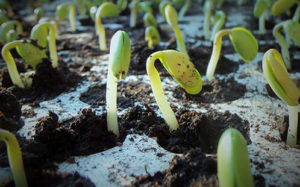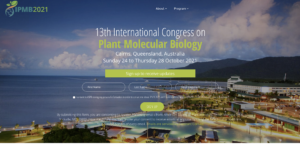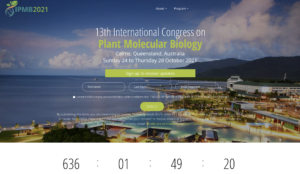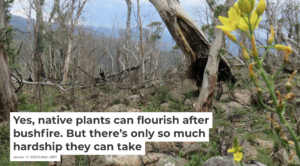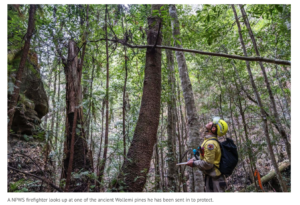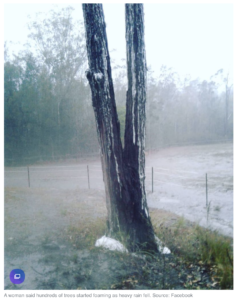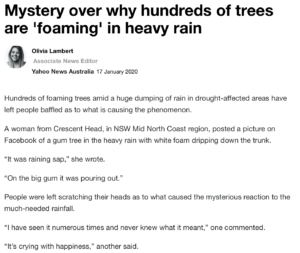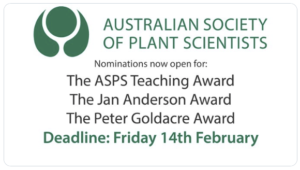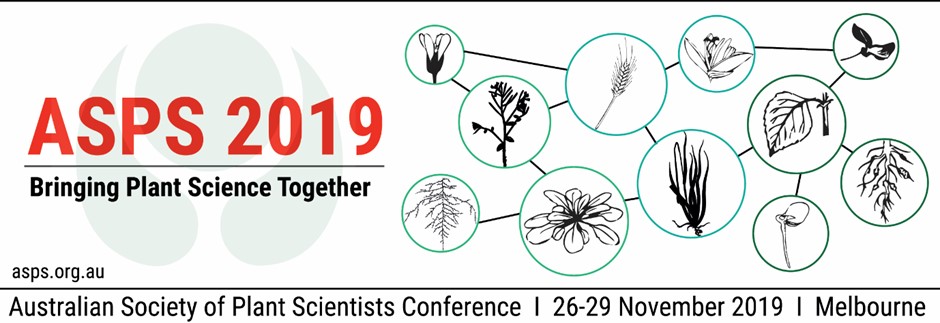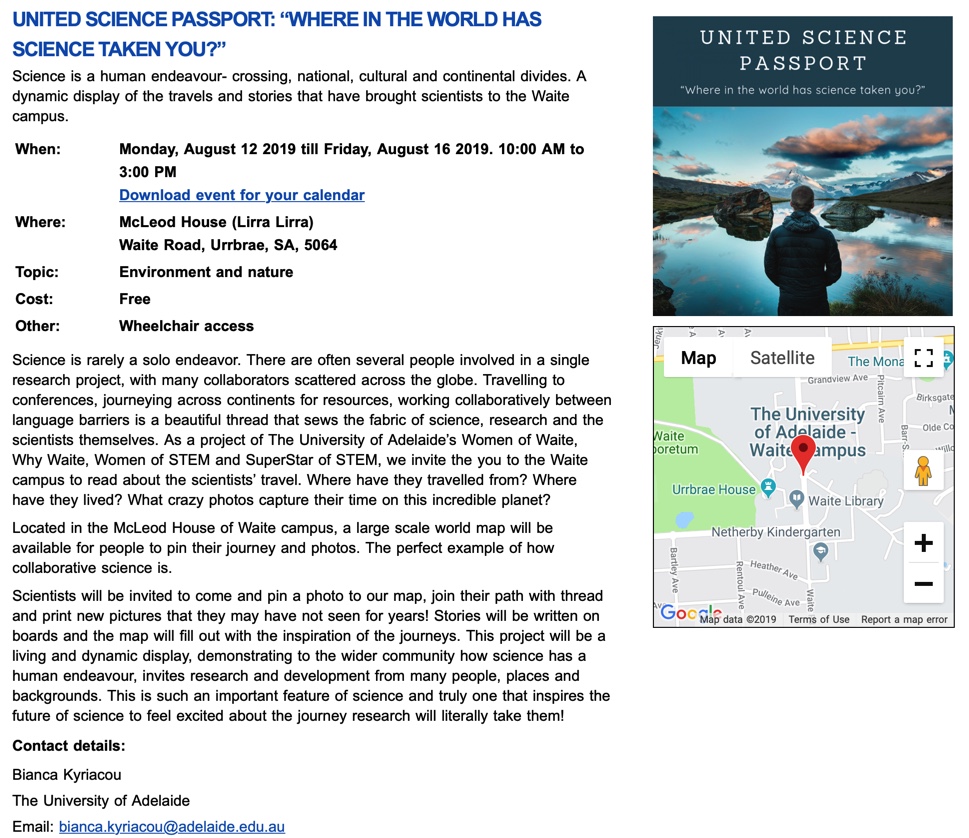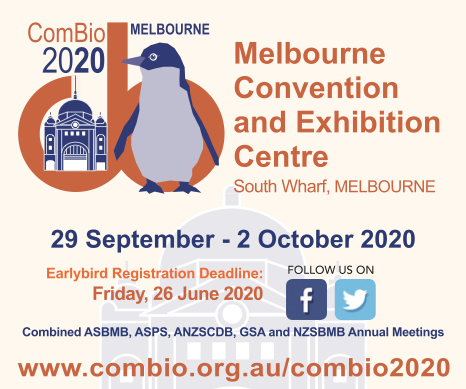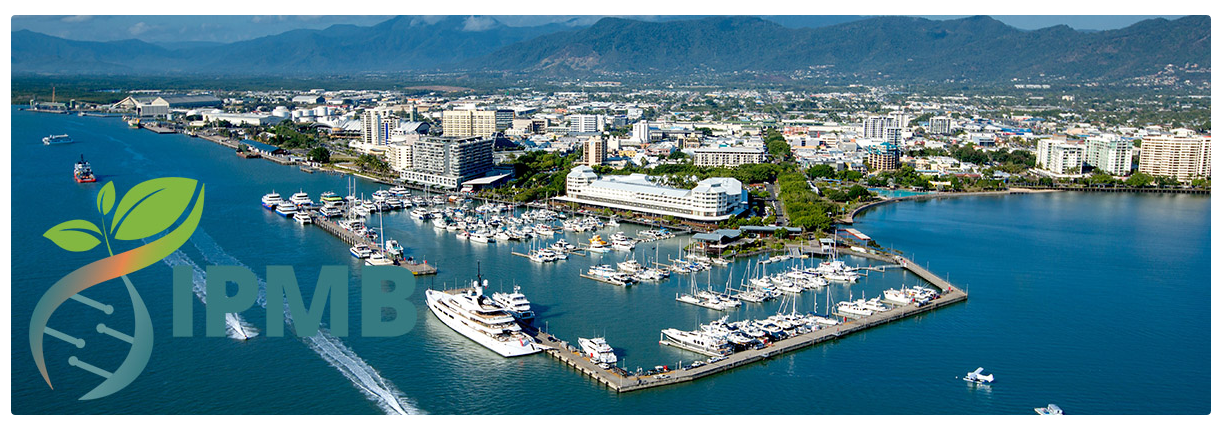- About
- Members
- Join
- Member log in
- Membership Renewal
- Member directory
- Life Members
- ASPS Life Member Professor Graham Farquhar
- ASPS Life Member Associate Professor Hendrik (Hank) Greenway
- ASPS Life Member Dr Marshall (Hal) D Hatch
- ASPS Life Member Dr Paul E Kriedmann
- ASPS Life Member Dr Mervyn Ludlow
- ASPS Life Member Emeritus Professor Rana Munns
- ASPS Life Member Conjoint Professor Christina E Offler
- ASPS Life Member Professor (Charles) Barry Osmond
- ASPS Life Member Emeritus Professor John W Patrick
- ASPS Life Member Dr Joe Wiskich
- Corresponding Members
- Elected Fellows
- Events
- Awards & Funding
- Employment
- Publications
- Research
- Teaching
- Menu
March Phytogen – Such hard times
24 March 2020
Welcome to Phytogen for March 2020. Unfortunately, this year will be remembered as the year our world tackled Covid-19. As we do this over the next few weeks and months, if it helps to alleviate uncertainty you can send me articles that inspire you (georgia.koerber@adelaide.edu.au) and to other members of our communications committee for sharing on Phytogen. Please include some commentary about why they inspire you and if they are in your research area. It would be awesome to receive some material where plants have contributed to solving global problems such as we are facing now, in the past or future.
To start, Chris Cazzonelli from the Hawkesbury Institute, Western Sydney University (WSU) has sent research by WSU and ANU. Click on the link or head to the website: https://phys.org/news/2020-03-darkness-unravel-energy.html. The research has discovered new chemical communication pathways that determine how plants change when they emerge from darkness in the soil to light with implications for their energy generation.
Something I have been amazed to read about is plants being used to create vaccines, as an alternative to chicken eggs; as bioreactors for growing vaccine proteins. The biopharmaceutical company from Canada, Medicago doesn’t work with a live virus, instead the team insert a genetic sequence into a soil bacteria, which is taken up by the plants, which then reportedly begin to produce the protein that can then be used as a vaccine. They soon hope to submit this unique technology for FDA approval. The difference between plants and eggs is “we go directly to producing the vaccine or the antibody without having to propagate the virus” Mr Bruce Clark said, CEO of Medicago.
This year, ASPS has had a new Honorary Secretary Simon Williams from ANU. Below he writes about his research.
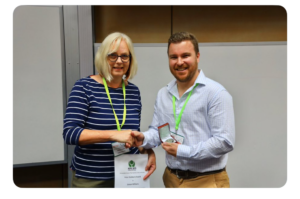
Simon Williams 2019 Peter Goldacre Recipient with ASPS President Kathy Soole at ASPS2019 LaTrobe University.
The structural-basis of plant innate immunity
It is estimated that plant diseases account for up to 15% of crop loses worldwide, presenting a significant economic, environmental and social challenge in a world facing increased demands on food, fibre and biofuels. While the lifestyles of plant pathogens are diverse, a common feature is the use of secreted proteins, collectively known as effectors, which promote pathogen virulence and facilitate disease. During infection plant pathogens can mobilise 10-100s of effector proteins. In response, plants utilise both extracellular and intracellular multi-domain immunity proteins to detect effectors and this recognition leads to disease resistance. The intracellular immunity receptors, known as nucleotide-binding oligomerisation domain-like receptors (NLRs), are arguably the most important plant immunity receptor and can recognise specific effectors to provide protection against potential pathogens. Plant genomes contain hundreds, in some cases thousands, of NLR genes, to ensure maximum protection within their environment. Despite this, resistance is defeated when this repertoire of NLRs can no longer perceive the presence of an effector during the plant-pathogen interaction. We are interested in understanding how NLR proteins perceive effectors and activate disease resistance pathways. To study this, we use a multidisciplinary approach harnessing the power of protein structural biology, biochemistry and biophysics to inform our studies in plants. The Peter Goldacre award recognises the contributions that I have made to understanding how NLR proteins signal via protein-protein oligomerisation through their N-terminal (see papers below). Of course, these achievements were the result of a large team effort and involved numerous national and international collaborators.
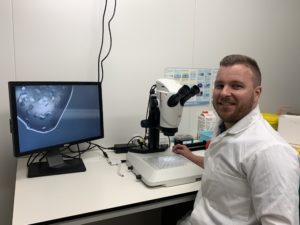
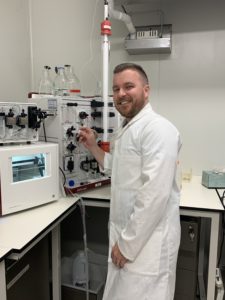
Recently, I started my own laboratory in the Division of Plant Sciences within the Research School of Biology at the Australian National University.
Simon in the lab working with plant proteins.
Our Structural Plant Immunology laboratory seek to understand the molecular-basis of fungal pathogenicity and plant innate immunity. A major focus of our work is the development of methodologies that will enable the engineering of synthetic plant immunity receptors. If successful, we believe these tools and techniques could revolutionise the number of NLR genes available to plant breeders to reduce losses induced by pathogens in instances where resistance does not exist or has been overcome.
I’m excited to take on the role of honorary secretary for ASPS. I joined ASPS at the start of my PhD and have benefited significantly through the collegiality and support that the society provides. I look forward to supporting and promoting the society in my new role.
Williams SJ, Sohn KH, Wan L, Bernoux M, Sarris PF, Segonzac C, Ve T, Ma Y, Saucet SB, Ericsson DJ, Casey LW, Lonhienne T, Winzor DJ, Zhang X, Coerdt A, Parker JE, Dodds PN, Kobe B, Jones JDG (2014). Structural basis for assembly and function of a heterodimeric plant immune receptor. Science, 344: 299-303.
Casey L, Lavrencic P, Bentham AR, Cesari S, Ericsson DJ, Croll T, Turk D, Anderson PA, Mark AE, Dodds PN, Mobli M, Kobe B, Williams SJ (2016). The CC domain structure from the wheat stem rust resistance protein Sr33 challenges paradigms for dimerization in plant NLR proteins. PNAS. 113 (45), 12856-12861.
Zhang X, Bernoux M, Bentham AR†, Newman TE, Ve T, Casey LW, Raaymakers TM, Hu J, Croll TI, Schreiber KJ, Staskawicz BJ, Anderson PA, Sohn KH, Williams SJ, Dodds PN and Kobe B. (2017) Multiple functional self-association interfaces in plant TIR domains. PNAS. 114: E2046-E2052.
Keep these meetings in your calendar: ComBio2020 and IPMB2021
 Keep sending your images to Tam Salter for our ASPS banners.
Keep sending your images to Tam Salter for our ASPS banners.
Please ensure they are .PNG , .jpg, .TIFF, or .pdf, with greater than 300 dpi, email: william.salter@sydney.edu.au
If the images have people, they will have to sign a permission form: ASPSbanner2020
Please print the permission form and have them sign then send along with your image to Tam, we look forward to receiving your images.
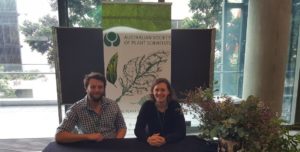
11 Feb International Day of Women and Girls in Science, award applications due this Friday.
09 February 2020
Dear ASPS members,
11 Feb is International Day of Women and Girls in Science.
February Phytogen is now available HERE. See the Plant Nutrition Trust Award reports and up coming conferences.
Applications for numerous prestigious ASPS awards are currently opened with a closing date 14th of February 2020. Nominate yourself. More details below.
Call for nominations for ASPS president elect
We are currently seeking nominations for the next ASPS president. If you have a passion for Plant Science and an interest in helping to drive and shape research and education in the Australian Plant Science community please consider nominating.
Nominations can be sent to the secretary@asps.org.au by Friday the 28th of February 2020
ASPS Research Awards
The Peter Goldacre Award and the Jan Anderson Award are the premier research awards from ASPS. The Peter Goldacre award is awarded for research contributions for early/mid-career researchers (male or female) within 10 years since PhD, and the Jan Anderson Award specifically recognises the significant contribution of mid-career female researchers.
ASPS Teaching Awards
The ASPS Teaching Award recognises excellence, innovation and/or other contributions with successful learning outcomes to teaching plant science at the University level.
Applications for these awards need to be sent to the secretary@asps.org.au by the 14th of February, 2020.
Please see full details and eligibility requirements on the ASPS website: https://www.asps.org.au/awards
Kind regards,
Dr Simon Williams
Honorary Secretary, ASPS
Phytogen February 2020
05 February 2020
Welcome to Phytogen for February. 2020 is the International Year of Plant Health. You can read more at the FAO website.
Also occurring this week will be United Nations International Day of Women and Girls in Science.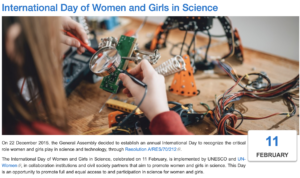
It is very timely then; to plan conferences and workshops for the year. If you want to advertise an event use this link. Below are some to get you thinking.
1. THE PLANT NUTRITION TRUST is inviting applications for awards to assist in carrying out a study tour or to attend a conference or such other activity related to their stated objectives. The TRUST has been established to encourage and promote research and technology transfer in the areas of plant mineral nutrition, soil fertility, fertiliser and soil amendment technologies and certain abiotic stresses. Related topics in agronomy and plant breeding etc will also be considered.
Awards will be made to promising PhD students, post-doctoral students and early-career scientists working in the areas mentioned above. Applicants must be currently working in Australia and linked with a recognised university or relevant institution. Details and application forms available by clicking on the below links. Applications close 20th March 2020.
pdf: PlantNutritionTrust_Intro&Appl_2020
word: PlantNutritionTrust_Intro&Appl_202
2. FOOD AND WATER SECURITY INTERNATIONAL WORKSHOP: ENGINEERING AQUAPORINS TO BOOST CROP YIELDS AND WATER RECYCLING TECHNOLOGIES
12 May 2020 to 15 May 2020.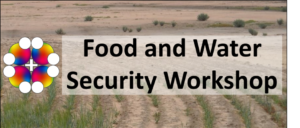
What types of new biotechnologies are needed to ensure food and water security in the future?
Join us for a workshop at the Shine Dome in Canberra (13-15th May 2020; https://www.shinedome.org.au/whats-on) to explore how we can use and engineer aquaporin proteins to boost crop productivity and advance water filtration technologies.
Student travel support is available thanks to ASPS – please apply, more details below. Discount early bird registration is now open and talks selected from abstracts will receive registration reimbursement – https://www.eventbrite.com.au/e/workshop-on-engineering-ion-channel-aquaporins-and-boosting-food-security-tickets-78557334101
Examples of workshop highlights include:
- Hear from Professor Steve Tyerman (University of Adelaide) and Professor Christophe Maurel (B&PMP, Montpellier) about the latest developments in controlling water relations, cell signaling and regulation of hydraulics in plants.
- Learn about the link between aquaporin function and cancer cell metastasis and the discovery of aquaporin ion channel features from Professor Andrea Yool’s research (University of Adelaide).
- Learn about the roles of aquaporins in influencing crop plant physiology from Professor Francois Chaumont’s research (UCLouvain, Belgium) on maize aquaporins, Professor Maki Katsuhara’s research (Okayama University) on barley aquaporins and A/Professor Tomoaki Horie’s work on rice aquaporins (Shinshu University).
- Learn about imaging the movement of element isotopes to understand aquaporin function from Professsor Keitaro Tanoi and A/Professor Natsuko Kobayashi (University of Tokyo).
- Discover new directions in technology development for water filtration from Aquaporin Asia’s Dr Sun Guofei. These technologies are used to purify astronaut waste water in space and can help us sure up our future water security on Earth.
- Build your knowledge in understanding how aquaporins help living cells tolerate osmotic stress and how we can use this information to create the biotechnologies of the future!
The 2020 International Ion Channel Aquaporin Workshop creates the opportunity to facilitate sharing knowledge, ideas and results in the area of studying the function and applications of ion-channel aquaporins. We have a particular focus on research related to engineering plant aquaporin function towards boosting future food security, and on research related to the study of ion channel aquaporins in plants and other Kingdoms of life.
We are looking forward to discussing potential avenues to engineer aquaporin function towards supporting future stability in crop productivity, improve water security and determine signaling processes that influence aquaporin function. Topics related to aquaporin permeability, regulation, signaling, physiological roles and evolutionary origins will be covered in the workshop.
There will be talks selected from submitted abstracts and registered speakers selected from abstract submissions will receive registration reimbursement. Courtesy of the Australian Society of Plant Scientists there is support for PhD/ECR student travel, and it would be wonderful if you are happy to encourage PhD/ECR students working on relevant research to contact us about sending in an abstract and applying for PhD student travel support towards participating in the workshop. The workshop is supported by the Australia-Japan Foundation and the Australian National University.
Further information related to the workshop can be found at the following webpage: https://biology.anu.edu.au/news-events/events/workshop-engineering-ion-channel-aquaporins-and-boosting-food-security
3. RN Robertson Travelling Fellowship. Applications opened 3rd February and close 2nd March 2020. Details here
4. ComBio2020 and IPMB2021
Here are reports from Kara Levin and Celine Mens, 2019 Plant Nutrition Trust Awardees.
Report on the Plant Biology 2019 conference: Plant Nutrition Trust, Kara Levin, University of Adelaide.
Plant Biology 2019, an event hosted by ASPB (American Society of Plant Biologists), took place in San Jose, California. I had the privilege to attend this conference along with over 1400 attendees. The conference covered a large number of areas within plant biology over the five days and was set-up to include major symposia sessions in the morning, networking events over lunch, and smaller specialised concurrent sessions in the afternoon. The major symposia talks covered some of the most interesting topics, many of them focused on seeing the larger picture within their niche field of research. An important concept presented at the conference was that the plant receptors used for triggering a symbiotic relationship with a pathogen were the same as those used to trigger a plant immune response – which raises the question on how such contrasting outputs are regulated by the same receptors. The data presented indicates that these receptors are influenced by the nutrient status of the plant. A plant experiencing nutrient deficiency is more likely to trigger a symbiotic response while one that is nutrient-sufficient will activate an immune response. This is an interesting concept for rhizosphere interactions, where a plant that is perhaps nitrogen deficient will induce symbiosis with microorganisms in the soil in order to reach sufficient nitrogen levels. This idea of dynamic plant responses should be considered in plant nutrition research.
Another fascinating talk was during the ‘Plant Synthetic Biology’ section. A group at the Max Planck Institute for Terrestrial Microbiology have created a more efficient Calvin-Benson-Bassham (CBB) cycle by using synthetic enzymes. Although applying this CO2-fixing system into agriculture is still in the research phase, it provided insights into the kind of ground-breaking research that is being made possible with new emerging technologies.
I presented a novel discovery from my PhD research on interactions between cereal cyst nematode and wheat during the symposia of ‘Plant-Biotic Interactions’. This was an exciting opportunity to discuss my results with a range of international researchers working on similar plant interactions. These discussions helped confirm my research findings as other researchers provided further evidence from their independent studies which reaffirmed of these novel plant-nematode interactions observed in my research. I sincerely thank ASPS for awarding me the Plant Nutrition Trust Travel Scholarship to assist in my conference travels. Attending Plant Biology 2019 was a great experience and perfectly timed as I finish writing a manuscript on my presented research as well as the rest of my PhD thesis.
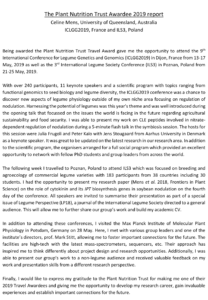
Lastly, and importantly, there is only one week left to apply for our Society awards. Apply Now!
We are also rolling out banners for each of our states to display at conferences, meetings and workshops. See the banner mask below.

If you have some great images, email them to Tam Salter.
Please ensure they are .PNG , .jpg, .TIFF, or .pdf, with greater than 300 dpi, email: william.salter@sydney.edu.au
If the images have people, they will have to sign a permission form: ASPSbanner2020 Please print the permission form and have them sign then send along with your image to Tam, we look forward to receiving your images.

Nominate for an ASPS award, Phytogen and GPC e-bulletin
27 January 2020
Dear ASPS members,
Applications for numerous prestigious ASPS awards are currently opened with a closing date 14th of February 2020.
The January edition of Phytogen is out now and can be accessed HERE.
The January 2020 Global Plant Council e-bulletin can be accessed HERE.
ASPS Research Awards
The Peter Goldacre Award and the Jan Anderson Award are the premier research awards from ASPS. The Peter Goldacre award is awarded for research contributions for early/mid-career researchers (male or female) within 10 years since PhD, and the Jan Anderson Award specifically recognises the significant contribution of mid-career female researchers.
ASPS Teaching Awards
The ASPS Teaching Award recognises excellence, innovation and/or other contributions with successful learning outcomes to teaching plant science at the University level.
Applications for these awards need to be sent to the secretary@asps.org.au by the 14th of February, 2020.
Please see full details and eligibility requirements on the ASPS website: https://www.asps.org.au/awards
Kind regards,
Dr Simon Williams
Honorary Secretary, ASPS
January 2020 Phytogen
27 January 2020
It is a New Year and a new decade. Over the last couple of months, you might have been reflecting on how tough the ecology in our country, Australia; has to be. Our plants and soils are quite well adapted to recover after the last couple of months of bushfires, and hot days with lots of sun exposure.
There are many incredible articles to read. Click on the pictures to read articles about recovery and protecting the Wollemi pine.
There have also been downpours of rain and hail for our plants to contend with. Another post from 2014 explains the science.
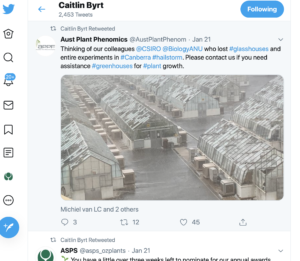
Throughout 2020 we wish you all the best for resuming your experiments and interpreting the results. Nominations are now open until the Friday 14th February 2020 for our society awards. Follow this link to the awards page and to find out all the details.
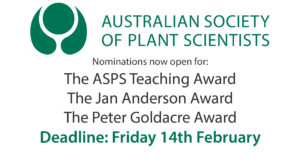 Upcoming in February, is NEPS, with open consultation in each state.
Upcoming in February, is NEPS, with open consultation in each state.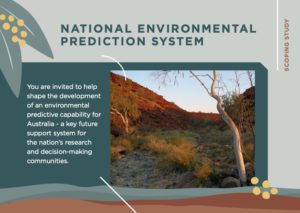
Our meeting is in September 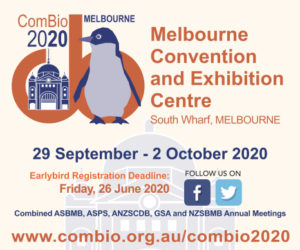 and also save the date for Sunday 24th October 2021.
and also save the date for Sunday 24th October 2021.
IPMB2021 will be an event not to be missed. You can keep up with the community as this meeting progresses by checking the plantae website.
December 2019 Phytogen
15 December 2019
Welcome to the last edition of Phytogen for 2019. We enjoyed seeing you at our annual conference last month. La Trobe University was delighted to host the Australian Society of Plant Scientists conference from 26 to 29 November in the stunning Centre for AgriBioscience (AgriBio) in Melbourne. Over 200 participants attended the meeting including both national and international delegates from our wonderfully diverse community of plant scientists, agronomists, nutritionists, educators, industry and government representatives.
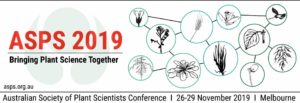
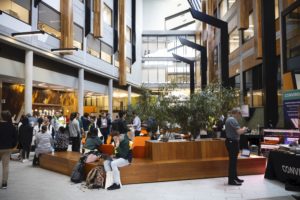
The meeting kicked off with a student networking lunch where students gained stickers each time they engaged each other in conversation. Extra stickers were awarded by chatting with the international keynote speakers including Prof Nicolaus von Wiren and Dr Fabian Pfrengle (Germany), Prof Jianping Hu, Prof Dan Szymanski and A/Prof Julie Law (USA), Prof George Bassel (UK) and Prof Mao Long (China). Congratulations to Fiona Kang who collected the most stickers and the student networking prize! The first session also highlighted the amazing work of the Society’s students with ASPS student representatives Mr Yingxuan Ma and Mr Ronan Broad undertaking chairing duties. The great atmosphere continued with informative and entertaining talks by nutritionist Prof Jennie-Brand Miller and the ‘poster teaser’ presenters before relaxing at the Welcome dinner and catching up with friends and colleagues.
The meeting continued with a packed agenda and some new themes including insights into medicinal agriculture and emerging and transformational technologies in genomics and phenotyping. The program also featured excellent presentations from ASPS award winners’ Dr Monika Murcha (Jan Anderson Award), A/Prof Sigfredo Fuente (Teaching Award), Prof Ros Gleadow (JG Wood Award) and Dr Simon Williams (Peter Goldacre Award).
A shared biotic intera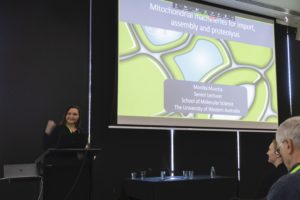 ctions session on the final day with the Australasian Plant Pathology Society Conference celebrating their 50thanniversary was also a highlight. The Grains Satellite meeting held thereafter gathered researchers and breeders from across the country and focussed on the pipeline to delivering enhanced grain yield in addition to quality traits relating to food applications and nutrition.
ctions session on the final day with the Australasian Plant Pathology Society Conference celebrating their 50thanniversary was also a highlight. The Grains Satellite meeting held thereafter gathered researchers and breeders from across the country and focussed on the pipeline to delivering enhanced grain yield in addition to quality traits relating to food applications and nutrition.
Dr Monika Murcha (Jan Anderson Award)
Social events at ASPS 2019 included tours of the La Trobe Wildlife Sanctuary, Posters and Drinks sessions and a Society dinner at the new La Trobe Sports Park pavilion. Across the week there was a fantastic atmosphere in AgriBio with a real sense of community and collaboration. The meeting was a great opportunity to share knowledge and resources, generate new ideas and identify avenues for translation. A huge thanks to all those who made it a success, especially our wonderful undergraduate, Honours and PhD student volunteers and poster judges.
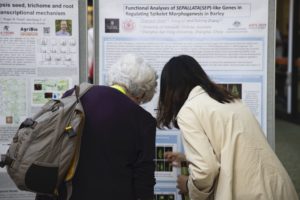
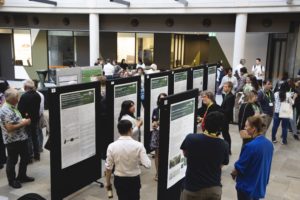
In addition, we extend our sincere thanks to the event sponsors including GRDC, BioPlatforms Australia, Agriculture Victoria, Conviron, Laftech, Agilent, Cann Group Limited, ARC Centres of Excellence Plant Energy Biology and Translational Photosynthesis, GlycANZ, La Trobe Institute for Agriculture and Food (LIAF), ARC Medicinal Agriculture Hub and Department of Animal, Plant and Soil Sciences at La Trobe, Australian Plant Phenomics Facility and the journal Plants.
We look forward to seeing you again next year at ComBio at the Melbourne Convention Centre (29 September to 2 October, 2020, website www.combio.org.au/combio2020/) and bringing our wonderful society of plant scientists closer together.
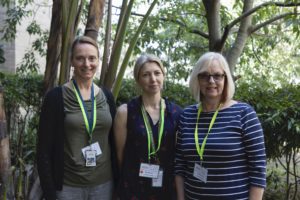
Dr Kim Johnson and Dr Monika Doblin with Professor Kathleen Soole (ASPS President) on behalf of the ASPS 2019 Meeting Organising Committee.
Photos taken by William Salter.
During the AGM and in Novembers Phytogen, we outlined how you can vote for state representatives. If you haven’t yet voted, you can ahead of ComBio2020. Go to: https://www.surveymonkey.com/r/8KH6FV5
We need 2/3 rd of financial members to vote. If you would like to be part of the discussion click HERE. To renew your membership so you are a financial member click HERE. You can request a new password be sent to your registered e-mail address.
We also want to acknowledge Janet Wheeler (La Trobe) and John Evans (ANU) awarded life members. Thank you for all the work you do for our society. Catch the buzz with lots of ARC funding for plant science and our ASPS Plant Science Education Representative Dr Beth Loveys with Dr Karina Riggs has won the University of Adelaide Stephen Cole the Elder Award for Excellence and the Vice Chancellor and President’s Award for Excellence. She writes for us below.
Like all higher education institutions, the University of Adelaide awards excellence in a range of different areas of teaching each year. This year I was honoured to be the recipient, along with my colleague and dear friend Karina Riggs, of the University of Adelaide’s premier teaching award, Stephen Cole the Elder Award for Excellence in the category of Leadership, Support and Enhancement of Teaching Practice and also the Vice Chancellor and President’s Award for Excellence.
As Education Specialists, Karina and I work as a team to enhance engagement, learning outcomes and the learning experience for our students at the Waite campus of the University of Adelaide. We achieve this by supporting colleagues to reflect upon their own teaching practices, embrace change and have the courage to adopt new learning and teaching initiatives through a variety of avenues such as; Innovative Teaching @ Waite, Professional Development workshops and co-facilitation of the University wide Community of Practices.
One of the characteristics of our journey from being part-time Associate lecturers to full-time Senior Lectures and leaders in learning and teaching has been the amazing mentors who have guided us along the way. We have always been open to learning from and listening to colleagues not only within our discipline of plant science but also from diverse areas such as medicine, dentistry and the professions.
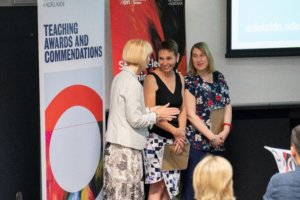 ASPS Plant Science Education Representative Dr Beth Loveys with Dr Karina Riggs from University of Adelaide.
ASPS Plant Science Education Representative Dr Beth Loveys with Dr Karina Riggs from University of Adelaide.
We have led by example by embedding innovative teaching practice in all of our courses and most importantly building authentic working relationships with our students. Our teaching is largely driven by the idea that once the students know that you care they soon care about how much you know (a variation on a statement attributed to Theodore Roosevelt). Being recognised for your contribution to improving the student learning and experience at University is obviously wonderful but more importantly it creates opportunities to continue to promote and support high quality science teaching across the University and more broadly the sector.
Nominations are now open for our 2020 awards. To read more go to: https://www.asps.org.au/awards. Keep up with us on twitter @asps_ozplants
Lastly, we hope you can manage to keep cool over Christmas, our thoughts are with those affected by drought and bushfire. We hope there will be opportunity for recharge, rest and some joy.
 giphy.com
giphy.com
Phytogen-November is ASPS2019 at La Trobe University
10 November 2019
We look forward to seeing you on the 26th November. Follow this link for the schedule.
Below you will read about an upcoming constitutional vote. We want lots of discussion before voting on the day of the AGM (28th November 2019), therefore please join this google group:
https://groups.google.com/d/forum/australian-society-of-plant-scientists
The link will take you to Google Groups. If you have a gmail account, ‘Sign in to view this group’ and then you will be able to post a reply. Otherwise to post, create a gmail account. You can follow steps on this support page for help: https://support.google.com/groups/answer/1067205?hl=en It also details how it is possible to add alternate email addresses if you don’t want to always have to remember a gmail account.
If you wish, you can ‘Subscribe to this group’, you can enter any email address you like, then you will be sent an email for you to confirm your subscription and then you will receive emails when there is activity.
We hope you will join the Google Group to post replies and contribute to discussions related to the ASPS. We also encourage new members and students to participate. If you have difficulties joining the discussion or wish to take up membership, please contact Dr Janet Wheeler (janet.wheeler@latrobe.edu.au) or one of our website and communications team (https://www.asps.org.au/about/website-communications-sub-committee-2)
ASPS AGM and constitutional vote
Dear ASPS members,
The 2019 Australian Society of Plant Scientists Annual General Meeting (AGM) will take place during our annual conference ASPS2019 at 6.00 pm Thursday 28th November 2019 in the Victoria rooms, AgriBio Building, La Trobe University Bundoora, Victoria.
This year at our AGM, I am going to propose a change to the structure of the ASPS committee and Council which will require a change to our Constitution.
I would like to propose that we change from having Discipline Reps to State and Territory-based Reps. As part of this change I would like to propose that a role for the State Reps would be to encourage an informal gathering in their State or Territory, to promote plant science, young scientists and the Society each year. I could envisage that we could provide a small amount of funding each year to the rep to help facilitate this. The process for this can be defined at the AGM.
I am proposing this as I feel that the concept of Discipline-focused reps is somewhat redundant in an era of multi-discipline research. Further, we currently do not have all States represented in our current rep system. For example for 2019, NT, Queensland and Western Australia do not have local ASPS representation. I believe that this change in committee composition would ensure that this lack of representation would not occur and enable ASPS to be promoted more widely, the Society would be more visible and be able to provide more to its members, which in turn would lead to an increase in membership.
Of course we would retain other office bearers such as Plant Science Education and the Student Reps.
To move this process forward we need to change the following item in the Constitution of ASPS Inc;
- THE COMMITTEE
- a. the office bearers of the Society who shall be the office bearers of the Committee;
- where possible other members, each representing a subject discipline or a specific group (e.g.postgraduate students). The subject disciplines shall encompass the broad spectrum of the society’s scientific and educational interests together with due regard for each State and Territory being represented.
So I am proposing that Item 21 in the constitution be reworded to the following where I have marked in bold the change in text;
- THE COMMITTEE
- a. the office bearers of the Society who shall be the office bearers of the Committee;
- where possible other members, each representing a State or Territory of Australia or a specific group (e.g.postgraduate students). The subject disciplines shall encompass the broad spectrum of the society’s scientific and educational interests together with due regard for each State and Territory being represented.
This can only be done via the following process as outlined in the Constitution;
- ALTERATIONS TO THE CONSTITUTION
This Constitution may be altered or amended a. by resolution at an Annual General Meeting, provided that all members have the opportunity to vote by post or by proxy and b. the resolution is passed by at least a two thirds majority of financial members voting.
So, this will be an item at the AGM to be held during ASPS 2019. As not all members are attending this meeting or the AGM, we have organised an online voting system which will be open before the AGM (to be held on 28th November 2019) and close the morning of that day. Further we will have open a discussion forum, so that members can voice their opinion about the proposed resolution and others can view it if the wish.
If the Society wishes to accept this change, then I suggest that we keep the two systems running through 2020 or until the end of any Discipline Reps term and for 2020 we find people to nominate as reps in the States and Territories where ASPS is not currently represented.
I hope that you, as a financial member of ASPS Inc., will take the time to consider this and vote as we need 2/3 of financial members to approve it before we can move forward.
Details on voting including a link will be e-mailed through to you in the coming week.
Kathleen Soole
President – Australian Society of Plant Scientists (www.asps.org.au)
October 2019 Phytogen
19 October 2019
Welcome to October Phytogen. Hope you are making preparations towards our meeting in November. You can still register, use this link: https://www.asps.org.au/combio/asps-2019/about-asps-2019 Well, it has been our 60th year and Professor Roslyn Gleadow (@RosGleadow) from Monash University has written a reflection for us. Roslyn will be delivering the JG Wood lecture on Thursday 28th November. View the draft ASPS2019 program HERE
Reflection by Roslyn
Kingsley Rowan, my MSc supervisor, was a founding member of ASPP (as it was then). He walked into my office one day and said: “You should join the Society — and subscribe to the journal too.” (referring to the Australian Journal of Plant physiology, now Functional Plant Biology). So, I did. I’ve been a member ever since, even when I was out of research when I had my kids. I dropped getting the journal when I got a job working for Editor-in -Chief Laurie Martinelli as a copy editor for a while, but it’s still on my regular reading list.
People often wonder what is the point in joining professional societies? One important reason is that it provides a respectable, identifiable organisation for journalists to contact, and you can’t have a society without members. When I was President I often got calls from the media (e.g. the ABC, SBS, The Age etc.) to provide expert commentary on various things relevant to plants, GMOs, climate change and so on. This is really, really important. Even more so now with all the crazy ideas out there in internet-land. I am now President of the Global Plant Council (of which ASPS is a member organisation) and we are aiming to be a reliable point of contact for media and policy makers at the international level.
I believe there is strength from being part of professional societies such as ASPS. I’ve been a regular ASPS/ComBio attendee and enjoy the way these conferences stretch me beyond my comfort zone and force me to think about things outside my own immediate field. The national-scale networking is also invaluable. I couldn’t travel overseas for what seems like decades when my children were growing up (plus the money issue, or lack thereof). Going to the annual meetings was my only option. I often only went for 2 days, timed to coincide with particular international speakers (who I made sure I met) and the annual society dinner, which was always fun. I organised that one year, so I know how much work it is herding cats, but well worth it. The contacts with leading national and international scientists have stood me in good stead – I have had long standing collaborations with several of them ever since.
 There was a seismic shift in plant physiology in the 80s and 90s with the enormously valuable input from molecular biology. This created a dilemma: should we join with the ASBMB and ANZSCDB as ‘ComBio’ or go it alone? The advantage of having a combined meeting is that there is a lot of overlap and people will only generally go to one generalist, national meeting. Also, being a bigger meeting, the trade fair is bigger, and ASPS receives important income from that. The downside is that we have to work hard to keep our identity, especially we ecophysiologists[1]. The new system of alternating a plant-focussed meeting with ComBio seems like an excellent solution and hats off to the Council who agreed to do this.
There was a seismic shift in plant physiology in the 80s and 90s with the enormously valuable input from molecular biology. This created a dilemma: should we join with the ASBMB and ANZSCDB as ‘ComBio’ or go it alone? The advantage of having a combined meeting is that there is a lot of overlap and people will only generally go to one generalist, national meeting. Also, being a bigger meeting, the trade fair is bigger, and ASPS receives important income from that. The downside is that we have to work hard to keep our identity, especially we ecophysiologists[1]. The new system of alternating a plant-focussed meeting with ComBio seems like an excellent solution and hats off to the Council who agreed to do this.
Next month is the first of the new-look ASPS meetings. Last time I went to ASPS at La Trobe it was on at the same time as ASBMB, which was in downtown Melbourne, and people were racing between the two by car. Crazy! I encourage you to come and learn stuff, give back, participate in some informal mentoring and make some life-long friends.

Prof Ros Gleadow, President ASPS 2010-2012 with cassava varieties and Bec Miller from University of Melbourne.
[1] The satellite “EcoFizz” meetings started by Susanne Schmidt, Mark Hovenden and me, and followed by Oula Ghanoum and David Tissue were great – does someone want to start those again?
Science meets Parliament is designed to bring together decision makers and Australia’s leading STEM professionals, to promote the role of science, technology, engineering and mathematics – and the valuable part these sectors can play in politics.
This will be the 20th year and ASPS will be represented by Tracey Cuin and Ricky Milne
You might remember an inquiry has been launched by the Standing Committee on Agriculture and Water Resources. It is of particular interest to members of ASPS and Tracey Cuin and Mike Haydon are preparing a submission. The link information for the inquiry can be found here and submissions close Thursday 28th November.
If you haven’t managed to send suggestions to the ASPS secretary Vanessa Melino (vanessa.melino@unimelb.edu.au) have a go now. This is a great opportunity for us to drive policy. I was at a workshop last week where it became evident how important this is. It it is for us to come up with clear policy with your suggestions of key priorities for plant/agricultural sciences in relation to the terms of reference: “The Committee will inquire into and report on, the opportunities and impediments to the primary production sectors realising their ambition to achieve a combined $100 billion value of production by 2030.” You also might find it interesting to read this discussion paper. 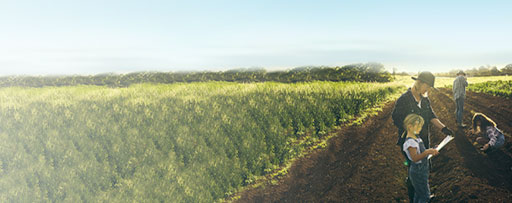 Image courtesy of KPMG
Image courtesy of KPMG
Celebration of Professor Sally Smith
A reminder there will be a gathering on October 25th 2019 to celebrate the life of Professor Sally Smith a long-standing member of ASPS who passed away suddenly on 13 September 2019.
Sally was Emeritus Professor in the School of Agriculture, Food and Wine, University of Adelaide. She was also Honorary Professor at the China Agricultural University and the Chinese Academy of Sciences.
Sally was a world authority on the mycorrhizal symbiosis between plants and fungi. She made outstanding contributions to our understanding of the structure of the plant-fungal interface, of nutrient transfer across it and of the molecular processes involved in forming and controlling the interface.
Sally completed her BA and PhD at Cambridge (1965) and her DSc at the University of Adelaide (1991). She held a personal Chair in Soil Science (1995) and was Director of the Centre for Plant Root Symbioses (1998). She was elected to the Australian Academy of Science in 2001. Just two months ago, Sally obtained an inaugural ‘Eminent Researcher’ award from the International Mycorrhiza Society. To celebrate her life there will be a gathering at Adelaide University’s Waite Institute, Beltana Café, McLeod House on the University of Adelaide Waite Campus, at 4pm on 25 October 2019. For further details and to RSVP please use this link. If you would like to share information, photos or memories as part of our ASPS tribute for Sally, please share these with Dr Stephanie Watts-Williams (stephanie.watts-williams@adelaide.edu.au), who is kindly leading our creation of an ASPS tribute.

Phytogen – September 2019
10 September 2019
Welcome to Phytogen for September 2019. It is getting closer to our annual meeting. A draft timetable can be viewed on the ASPS2019 website. Abstracts for posters (only) are still open until 30th September. Registration is still open until then too. You can register and submit your poster abstracts by clicking on this link. We look forward to seeing you in November. It will be a busy month for science as Science meets Parliament will also be occurring.
Science meets Parliament is designed to bring together decision makers and Australia’s leading STEM professionals, to promote the role of science, technology, engineering and mathematics – and the valuable part these sectors can play in politics.
This will be the 20th year and ASPS will be represented by Tracey Cuin and Ricky Milne. Tracey works at the University of Tasmania. She is researching action potential signals through plants. Fast responses to an external threat depend on the rapid transmission of signals. Ricky works at CSIRO Agriculture and Food, Canberra. He is researching resistance to fungal pathogens, and exploiting the transferability of this resistance to other economically important crops. Fungal diseases such as rust pose a constant threat to global grain production.
Each year more than 200 scientists, technologists and STEM professionals take part in this unique event over two very full days. On Day One delegates hear from leaders in policy; media; science and technology; and advocacy. They share their rich insights through panel discussions, presentations and workshops. Day One then concludes with a Gala Dinner which traditionally sees the Prime Minister and Opposition Leader present their position and plans for science, technology and innovation in Australia.
On Day Two, delegates meet face-to-face with Parliamentarians across the political spectrum. It’s a chance for scientists and technologists to share their enthusiasm for science and information about their work and discipline. This is a rare opportunity to speak directly to politicians and is the highlight for most who attend. Delegates will also have the chance to be part of the live audience for the National Press Club Address and to attend a session of Parliamentary Question Time. Additionally, delegates get ample opportunities to meet other men and women working in STEM – from early career researchers through to senior decision-makers. Below are reports from Janet Wheeler, La Trobe University and Mike Haydon, Melbourne University who attended in 2018.
Janet: In Feb 2018 I represented ASPS at Science meets Parlianment. It was a whirlwind 2 days with plenty of networking, seminars, workshops, meetings and photo opportunities.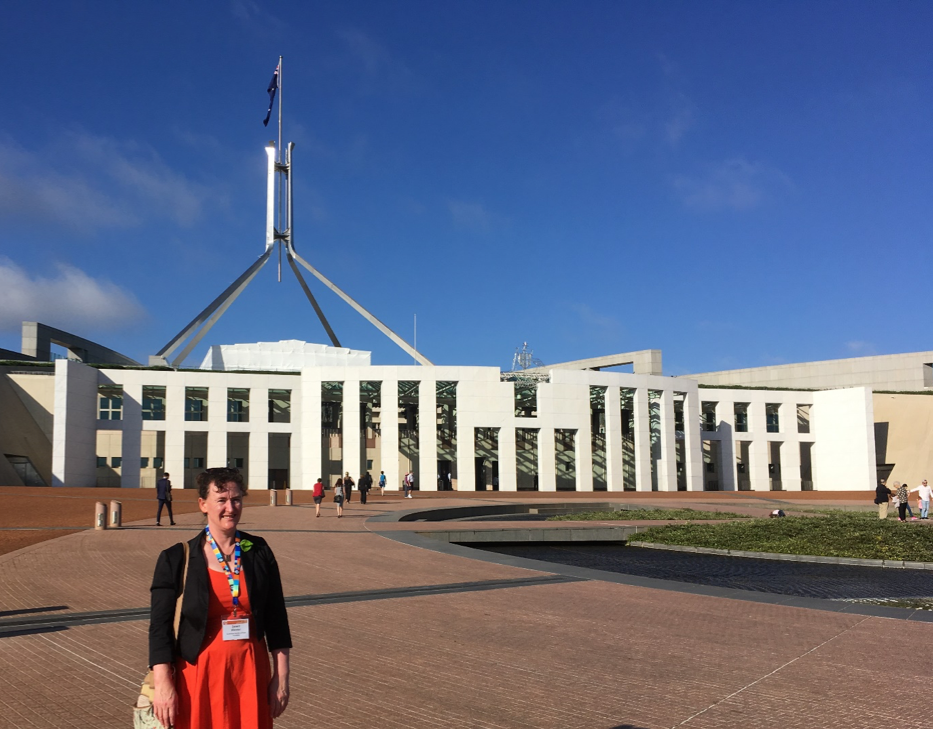
The first day was spent at the National Gallery where we heard from Dr Cathy Foley, CSIRO Chief Scientist who highlighted the responsibility we have to ensure our elected leaders have the opportunity to access our expertise. Science and technology effect the available solutions. Dr Foley also shared advice on how to hone your pitch and shape the discussions we would be having the following day with members of parliament.
The next morning we made our way through security at Parliament House and saw “Chuck the shrimp” embeded in the foyer floor. 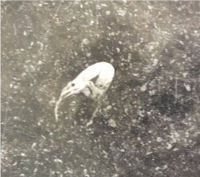 I met with Graham Perrett Federal Member for Moreton (Qld) and highlighted the significant contribution plants make to the Australian ecomomy and contibution plant science makes to current and future challenges.
I met with Graham Perrett Federal Member for Moreton (Qld) and highlighted the significant contribution plants make to the Australian ecomomy and contibution plant science makes to current and future challenges.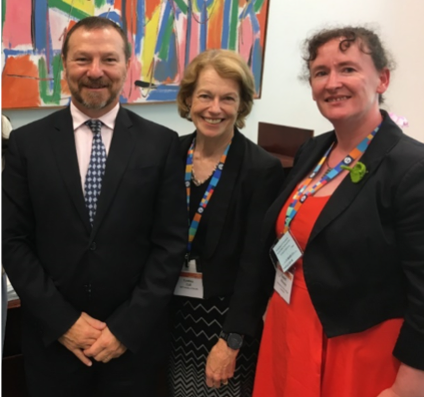
Another highlight for me was seeing Question Time in person. It happened to be an exciting day as Barnaby Joyce was a day or so away from steping down as Deputy Prime Minister. So theatrical.
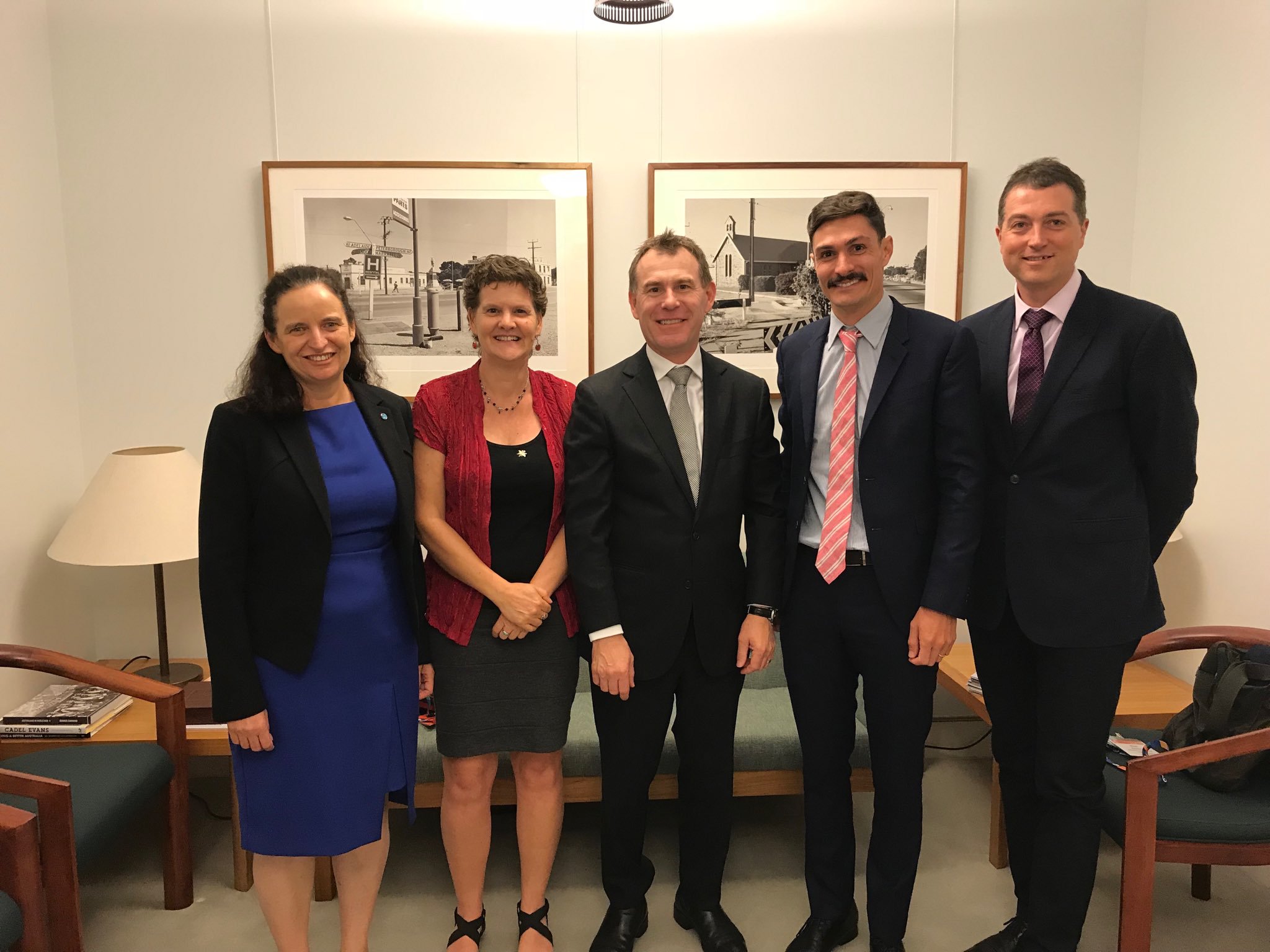
Mike Haydon (second from right) with Nick Champion (middle) and Rachel Burton (second from left).
Mike: I had the pleasure of representing the ASPS as a delegate at Science meets Parliament in February 2018, a major annual event organised by Science and Technology Australia. I enjoy the circus that is Australian politics and so it was quite a thrill to get some insight into the ‘Canberra bubble’. The first day was at the National Gallery of Australia and included talks, networking and panel discussions on science policy and engagement, involving our Chief Scientist, prominent science communicators and experienced lobbyists. In the evening, we attended the Gala Dinner in the Great Hall in Parliament House, where we mixed with MPs and were addressed by the then Opposition Leader, Bill Shorten, and the Minister for Jobs and Innovation, Michaelia Cash. This was before the infamous whiteboard incident and subsequent controversies.
On day two we attended Parliament House. There was a program of presentations from parliamentary science advocates including Kim Carr, Adam Bandt, Karen Andrews and Richard Marles, each making promises about supporting science. The major feature of SmP is the opportunity to meet with Parliamentarians in small groups. Together with Rachel Burton, I spent a relaxed 30 minutes with Nick Champion, the Assistant Shadow Minister for Science. We enjoyed lunch at the National Press Club, during which we were passionately addressed by Emma Johnson, the Presidentof STA, about the importance of supporting Australian science. In the afternoon, we were entertained by the interrogation of Barnaby Joyce during Question Time over his living arrangements.
I greatly valued the opportunity to attend SmP on behalf of ASPS. It provided a new perspective on how to contribute to science policy, presented novel networking opportunities and was a great experience to be inside The House.
To finish, have a look at #tsbakeoff and @TSCommissioner for Australia’s threatened species of plants and animals.
Phytogen – August 2019 Where in the World has Science taken you?
14 August 2019
It is National Science Week this week. 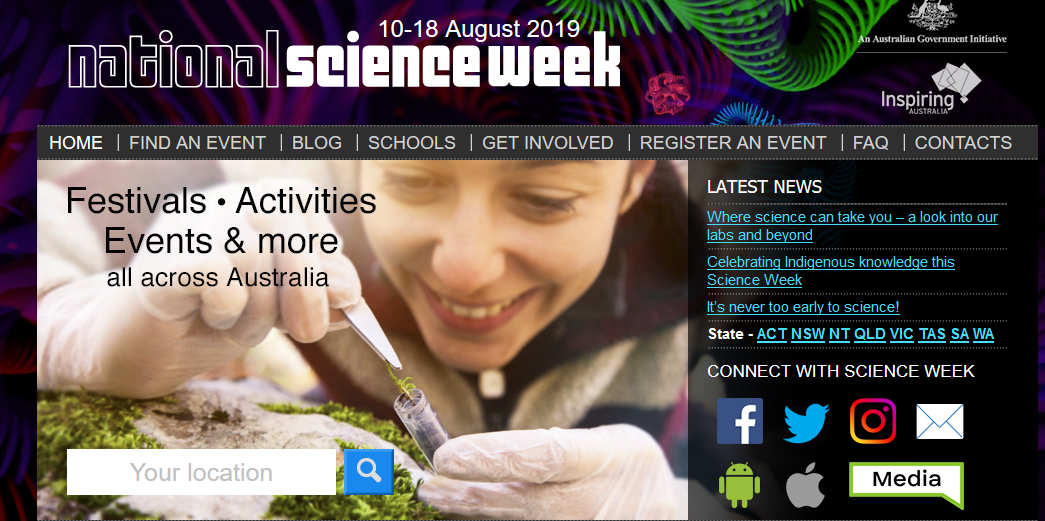 Taking a look at the events got me thinking about how amazing our peer networks and our travels have been. In particular, I draw your attention to an event occurring at Adelaide University
Taking a look at the events got me thinking about how amazing our peer networks and our travels have been. In particular, I draw your attention to an event occurring at Adelaide University
Even though you all won’t be able to make it to Adelaide this week, the theme of global peer networks is evident in this report by John Evans reflecting on this years Translational Photosynthesis Conference.
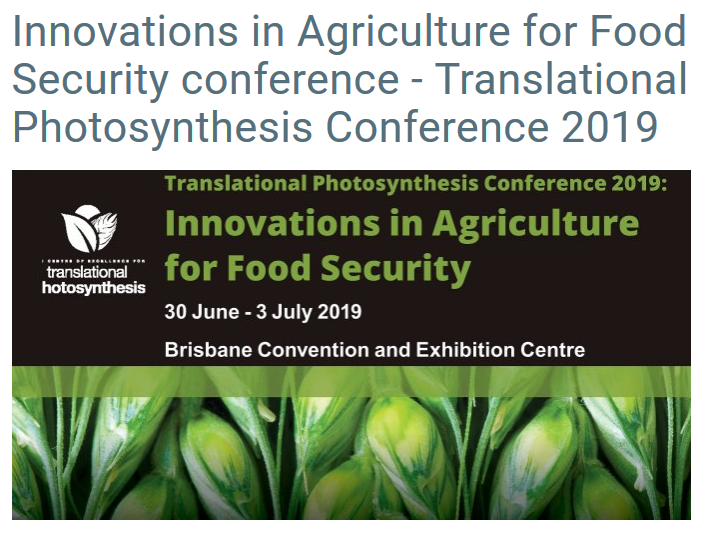
Report on the conference Innovations in Agriculture for Food Security
by John Evans
ASPS was one of the sponsors of this conference that was held at the Brisbane Convention and Exhibition Centre (30 June – 3 July). Over 100 people attended, including Professor Susanne Schmidt and Sana Khan from UQ who represented ASPS. To promote ASPS, a beautiful banner was designed and displayed.
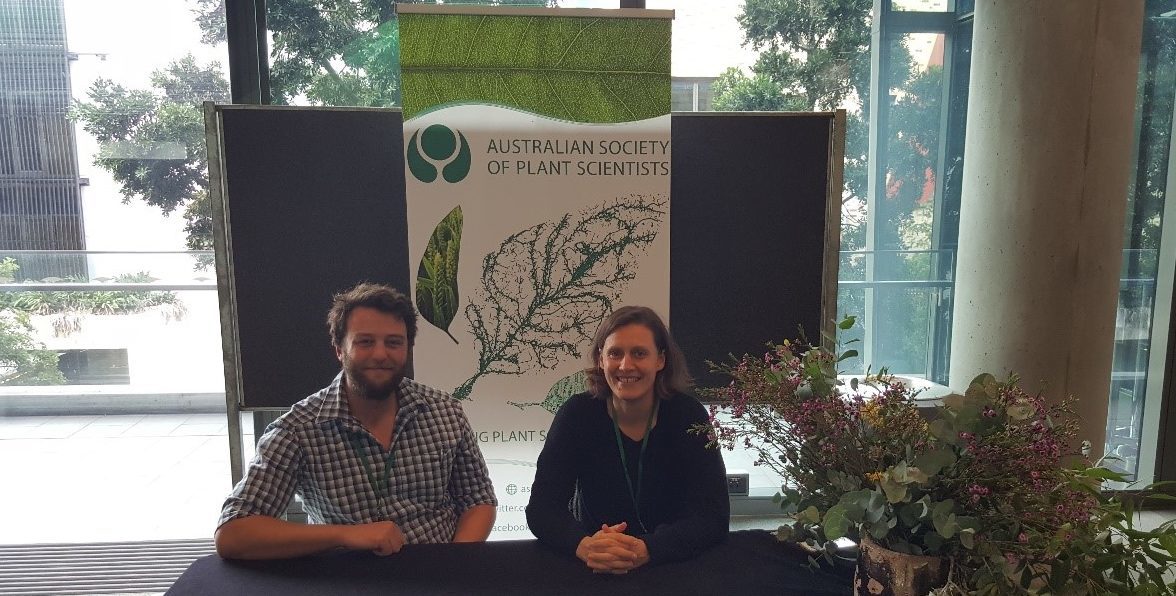
Tam Salter and Caitlin Byrt sat in front of the ASPS banner they designed.
Attendees came from the UK, Germany, Canada, USA, China, the Philippines, Czech Republic, Australia and NZ. One aim of the meeting was to raise awareness of the broader context within which researchers work. Establishing contacts and a network of people can be of great benefit to science and careers, so the meeting began on the Sunday evening with a forum for the next generation, organised by Alex Wu. Plenty of time was allocated to the morning and afternoon poster sessions. Preceding these sessions, poster presenters introduced themselves in flash talks to encourage people to come and discuss their work. It was clear from the animated groups, that these opportunities were well used. The ECR (usually early career researcher) acronym was redefined by Barry Osmond to include end of career, but his enthusiasm for espousing the possibilities of LIFT (laser induced fluorescence transient) method, clearly showed he is embarking on yet another research phase. By contrast, Graham Farquhar regaled us over the conference dinner with how many times during his early career his next step was only made possible by personal recommendations rather than from an excellent academic record. Metrics and regulation are the current challenges that need to be mastered by us all if we want to achieve career and food security.

Graham Farquhar recounting his early career as the ferris wheel spun behind him during the conference dinner (Photo by Natalia Bateman)
Raj Bhula, from OGTR (Office of the Gene Technology Regulator; Australian Government), explained the current state of Australian regulation for genetic modification of organisms. It is important that ASPS members take the opportunity to submit responses to enquiries over future changes to regulation so that the voice of scientific practitioners can be heard and counter activist groups that are opposed to GMOs. This is particularly pertinent for the rapidly emerging capability offered by CRISPR cas9.

Dr Raj Bhula, from Australia’s Office of Gene technology regulator (OGTR), delivering her keynote address (Photo by Natalia Bateman)
One final highlight was the keynote talk from Mark Stitt who reminded us of the problems we cause plants when growing them in square wave controlled environments. Turning the light on and off abruptly rather than gentle light transitions through natural dawn and dusk plays havoc with gene expression and presumably disrupts plant physiology.

Mark Stitt delivering his keynote address (Photo by Natalia Bateman)
Lastly, here is a report from one of our RN Robertson Travel Fellowship awardees. Carolyn Vlasveld from Monash University visited the University of Tasmania in May-Jun 2019.
RN Robertson Travelling Fellowship Report
by Carolyn Vlasveld
My PhD involves understanding differences between the leaves of juvenile and adult eucalypts. Working on this has led me towards studying juvenile-adult differences from the context of leaf hydraulic function. Consequently, the more discussion I had with my supervisors, the more it became apparent that I should investigate differences in leaf physiological traits. But my knowledge at the time entailed more about the ecology of morphological traits – I had little understanding of leaf physiology and measuring physiological traits.
This led me to visit Tim Brodribb’s laboratory at the University of Tasmania (UTAS) with the help of the RN Robertson Travelling Fellowship. A major focus of their work is the evolution of leaf physiological traits fundamental to hydraulic function. They had recently found differences in xylem vulnerability between the juvenile and adult leaves of Eucalyptus globulus (Lucani et al. 2019), using their novel optical vulnerability (OV) method. They suggested that I learn this method because it is often simpler than previous methods for measuring xylem vulnerability.
My visit focused on learning the OV method, among other techniques important to my thesis, such as preparing stained leaf samples for viewing anatomical structures. I measured the leaf xylem vulnerability of Eucalyptus globulus trees growing at the UTAS campus. The OV method involves measuring water potential and cumulative embolisms over time by using an optical camera. The camera detects embolism events by taking a time-lapse series of images of a dehydrating leaf. Light is transmitted through the leaf blade for each photograph. After xylem conduits embolise, they transmit less light through the leaf. Consequently, the occurrence of an embolism is detected by the light difference between two sequential images in the time-lapse. These embolism occurrences are later isolated and translated from the images to quantify cumulative embolisms as leaf water potential decreases over time.
A 3D-printed clamp containing the camera is secured over a dehydrating leaf, which encloses a section of the blade to prevent the entry of outside light. The camera connects to a raspberry pi computer, which programs the process of taking sequential photographs. Meanwhile I also learnt to use a Scholander pressure bomb and psychrometer to measure water potential.
This method will be used in my thesis to compare xylem vulnerability in other species occurring in different environments, and I wish to stay in contact with those at UTAS through this process.
I loved staying in Hobart and winter was a perfect time to visit – I caught the Pint of Science at Shambles Brewery, the view of snowy Mount Wellington from the city, and the UTAS School of Biological Sciences’ famous “Crib Night” where everyone dresses up to have a cribbage tournament.
Thank you very much to the Australian Society of Plant Scientists, the RN Robertson Fund, and the University of Western Australia for helping me take this trip. Thank you also to Tim Brodribb and others in his laboratory for making me feel welcome and sharing their skills and knowledge. This visit enriched my experience as a PhD student in addition to learning new techniques required for my thesis and increasing my understanding of leaf hydraulic function.
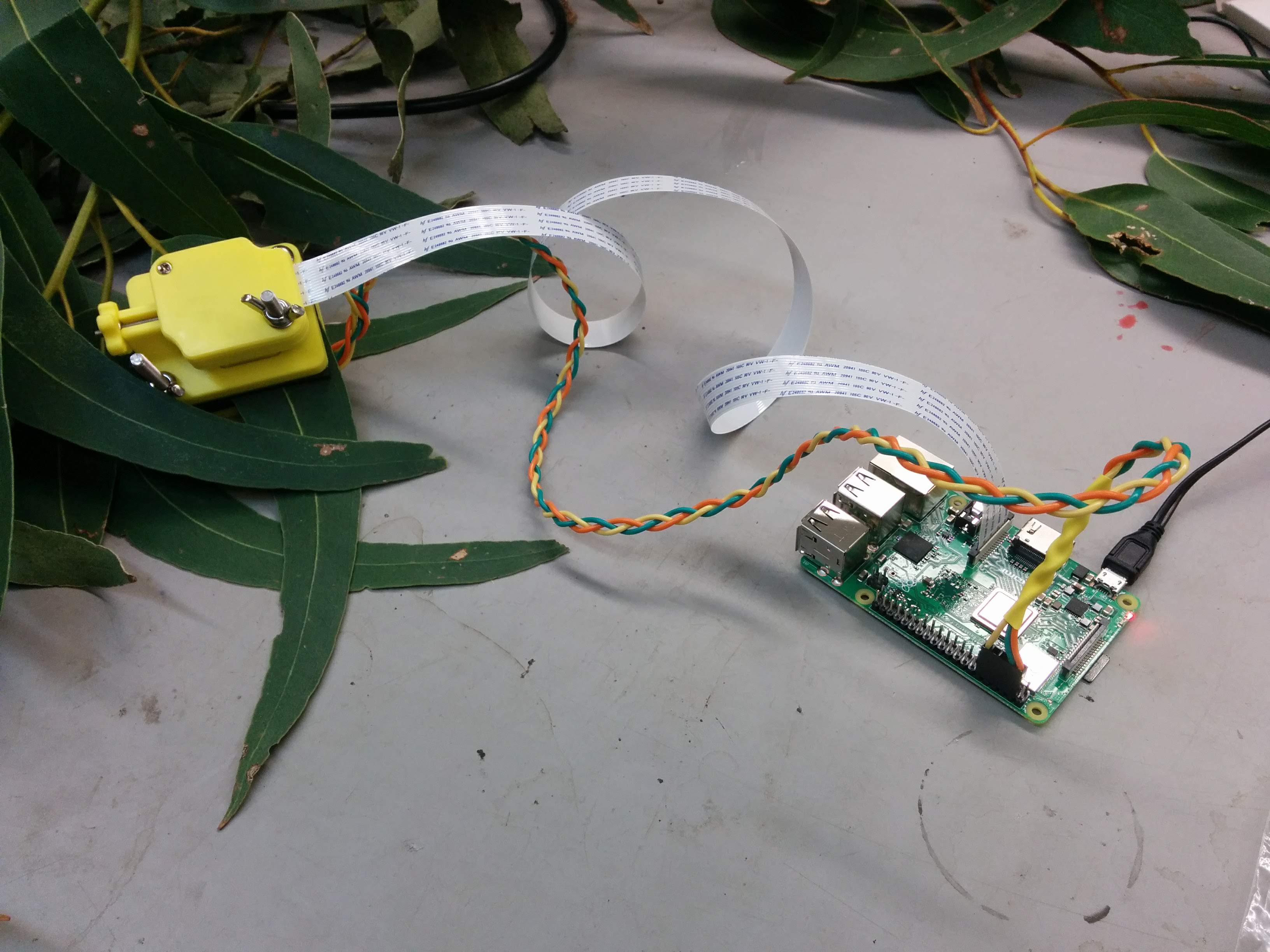
3D-printed leaf clamp containing a time-lapse camera (left) which connects to a raspberry pi computer (right)
References
Lucani CJ Brodribb TJ, Jordan GJ & Mitchell PJ (2019) Juvenile and adult leaves of heteroblastic Eucalyptus globulus vary in xylem vulnerability. Trees 1-12.
I hope you will be able to finish off the week attending a science event near you or catching up with your peers and their travels at an upcoming meeting, many are listed on our website (upcoming events/add an event page under the events tab) and you can add events…….. Next month will be reports from Science Meets Parliament.
| ASPS 2019 to be held 26-29th November 2019 is an event not to be missed! It will bring together plant scientists from across Australia and will be held at AgriBio, La Trobe University, Melbourne. |
| In 2020, |
| In 2021,
the 13th International Congress on Plant Molecular Biology will be in Cairns, Australia |
Recent Posts
Tags
Archives
- June 2025
- May 2025
- April 2025
- March 2025
- February 2025
- January 2025
- December 2024
- November 2024
- October 2024
- September 2024
- August 2024
- July 2024
- June 2024
- May 2024
- April 2024
- February 2024
- January 2024
- November 2023
- October 2023
- September 2023
- August 2023
- July 2023
- June 2023
- May 2023
- April 2023
- March 2023
- February 2023
- December 2022
- November 2022
- October 2022
- September 2022
- August 2022
- July 2022
- June 2022
- May 2022
- April 2022
- March 2022
- February 2022
- January 2022
- December 2021
- November 2021
- October 2021
- September 2021
- August 2021
- July 2021
- June 2021
- April 2021
- March 2021
- February 2021
- January 2021
- December 2020
- November 2020
- October 2020
- September 2020
- August 2020
- July 2020
- June 2020
- May 2020
- April 2020
- March 2020
- February 2020
- January 2020
- December 2019
- November 2019
- October 2019
- September 2019
- August 2019
- July 2019
- June 2019
- May 2019
- April 2019
- March 2019
- February 2019
- January 2019
- December 2018
- November 2018
- October 2018
- September 2018
- August 2018
- July 2018
- June 2018
- May 2018
- April 2018
- March 2018
- February 2018
- January 2018
- December 2017
- November 2017
- October 2017
- September 2017
- August 2017
- July 2017
- June 2017
- May 2017
- April 2017
- March 2017
- February 2017
- January 2017
- December 2016
- November 2016
- October 2016
- September 2016
- August 2016
- July 2016
- June 2016
- May 2016
- April 2016
- March 2016
- February 2016
- January 2016
- December 2015
- November 2015
- October 2015
- September 2015
- August 2015
- July 2015
- June 2015
- May 2015
- April 2015
- March 2015
- February 2015
- January 2015
- December 2014
- November 2014
- October 2014
- September 2014
- August 2014
- July 2014
- June 2014
Copyright 2017 Australian Society of Plant Scientists Disclaimer & Privacy
Website by Michael Major Media

